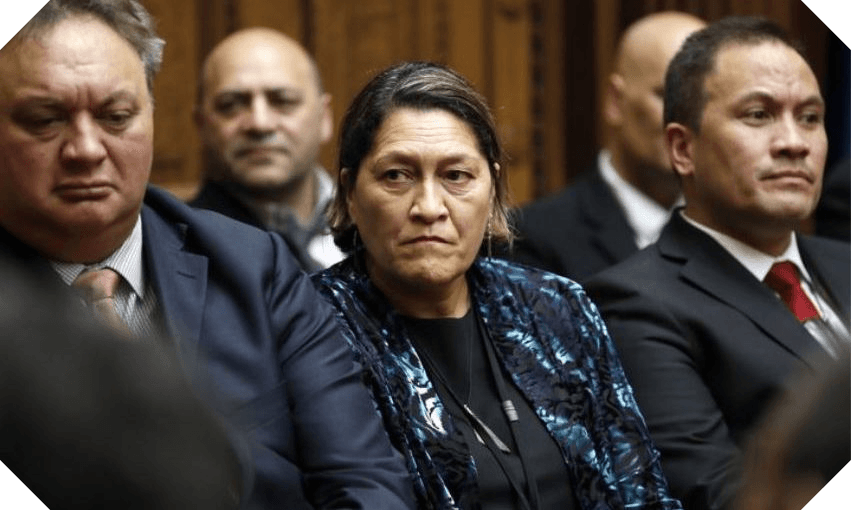The Labour caucus was blindsided and constitutional lawyers stumped by a very unconventional resignation, writes Duncan Greive in this excerpt from The Bulletin, The Spinoff’s morning news round-up. To receive The Bulletin in full each weekday, sign up here.
Political defections were commonplace in the early MMP era when significant new parties were regularly concocted – 35 occurred in the 90s alone. They have become much more scarce lately – Meka Whaitiri is only the fourth member of parliament to skip out on her party since 2010. That she was a minister with multiple crucial portfolios only served to compound the sense that yesterday’s press conference, announcing a switch of loyalty to Te Pāti Māori, was an extraordinarily rare event.
The Gone by Lunchtime podcast team assembled to record an essential emergency edition, and Toby Manhire noted incredulously that at the time of recording, “one thing we don’t know is whether she’s an MP any more”. This was a crucial plot point, drilled into in detail on The Spinoff by Otago law professor Andrew Geddis, who wrote that if we were to take Whaitiri at her word, she seemed to have triggered waka jumping legislation with her resignation email. Eventually house speaker Adrian Rurawhe resolved the situation by declaring that she would in fact remain an MP. What remains confusing to Geddis, however, is how the speaker could both accept that she wished to withdraw Labour’s ability to cast her vote in the house and was “then able to declare Meka Whaitiri to be an independent MP” without triggering the legislation. More to come here, surely, as RNZ is reporting this morning that opposition parties, including National, are asking that the speaker release correspondence from Whaitiri.
While RNZ’s Mata podcast had former Te Pāti Māori co-leader Marama Fox hailing the recruitment as a “master move” from party president John Tamihere, other news outlets were not as impressed with the staging of Whaitiri’s switch. Newshub’s newish political editor Jenna Lynch held nothing back, describing the the now ex-Labour minister’s defection as “launching a missile” at PM Chris Hipkins. He landed in the UK to the news, taking the shine off what should have been a merry week of gripping and grinning on the global stage.
The NZ Herald’s political editor Claire Trevett (paywalled) called the move shabby, but pointed out that thus far the worst has been avoided for Labour, as Whaitiri has refrained from explaining her reasons for leaving, beyond that being in Te Pāti Māori has her feeling that she has “unlocked the shackles”. Speculation is landing on the failure to return her to cabinet, despite an unblemished record following allegations of bullying in the last term, but for now Whaitiri is citing the pull of her new party over the push from her former – much to Labour’s relief.
And then there were 62
For much of this term Labour has seemed invulnerable: thanks to its extraordinary victory in the 2020 election it had 65 MPs this time last year – more than all other parties combined. Events of the last few months have chiselled away at that fortress, first through hard-typing rebel MP Gaurav Sharma, then the resignation of Jacinda Ardern, before yesterday’s defection of Whaitiri took the party down to 62 out of a 119 member parliament.
Yet while there remains a question mark over another recent ex-minister, the dejected Stuart Nash, even if he were to take up the overtures of NZ First, Labour alone would still hold a narrow majority. Still, as the election nears, marginal electorate MPs and those likely to be on the lower ranks of the list would be forgiven for watching what Whaitiri has done and thinking about whether their best post-election path back to parliament might also be with another party.
Can she hold Ikaroa-Rāwhiti?
“Ikaroa-Rāwhiti bleeds red through and through,” said Annabelle Lee-Mather on that excellent emergency edition of the Gone By Lunchtime podcast. It’s been 27 years since the party last lost there, and she made the salient point that through the Foreshore and Seabed legislation, “it’s been argued that no-one lost more than the people of Ikaroa-Rāwhiti, by virtue of the fact that they own a lot of the whenua along the coastline.” Yet even that controversy, which helped drive Te Pāti Māori into being in the first place, was not enough to unseat Whaitiri’s mentor, Parekura Horomia.
Whaitiri won a huge majority there in 2020, hauling in two in every three votes cast. 2023 will test whether she has built up sufficient transferrable personal loyalty to override the political loyalty to Labour which exists in the electorate. One major factor in her favour is that Labour will be starting from scratch in selecting a candidate – the whole parliamentary party, including its large and influential Māori caucus, seemed completely blindsided by Whaitiri’s defection. Perhaps Labour might call on Whaitiri’s own cousin, Heather Te Au-Skipworth, who is suddenly available, having awkwardly already been selected as Te Pāti Māori’s candidate for the seat. As if to show just how chaotic this whole process has been, as of this morning, Te-Au Skipworth remains listed as the party’s candidate on its website.





